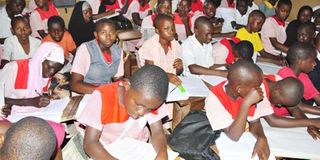Prime
Ministry to extend teaching in mother tongues

Pupils attending class at Side View Education Centre in Mbuya, Kampala. PHOTO BY STEPHEN OTAGE
What you need to know:
Under the thematic curriculum, local languages are used as a medium of instruction from P1 to P3 before switching to English Language
Kampala. The Ministry of Education will expand teaching using vernacular to improve literacy. According to the ministry, learners comprehend the curriculum better when it is introduced to them in the language most familiar.
State minister in charge of Primary Education Rosemary Seninde, speaking at the opening of the 4th Annual National literacy Conference in Kampala on Wednesday, said the ministry plans to generate relevant assessment tools to assess the learner’s competencies. She was representing the Minister for Education, Ms Janet Museveni.
Government introduced the use of mother tongue as medium of instruction in primary schools in 2007, during the introduction of the thematic curriculum. It was intended to promote interaction and participation in the learning process and improve children’s proficiency in reading and writing.
Under the thematic curriculum, local languages are used as a medium of instruction from P1 to P3 before switching to English Language. The guideline was later relaxed for urban schools to use English as a medium of instruction.
“The impact of the curriculum review will take some time given the challenges that the review has gone through. For now, though not much, there is an improvement,” Ms Connie Kateeba, National Curriculum Development Centre director said in an interview in February 2014.


